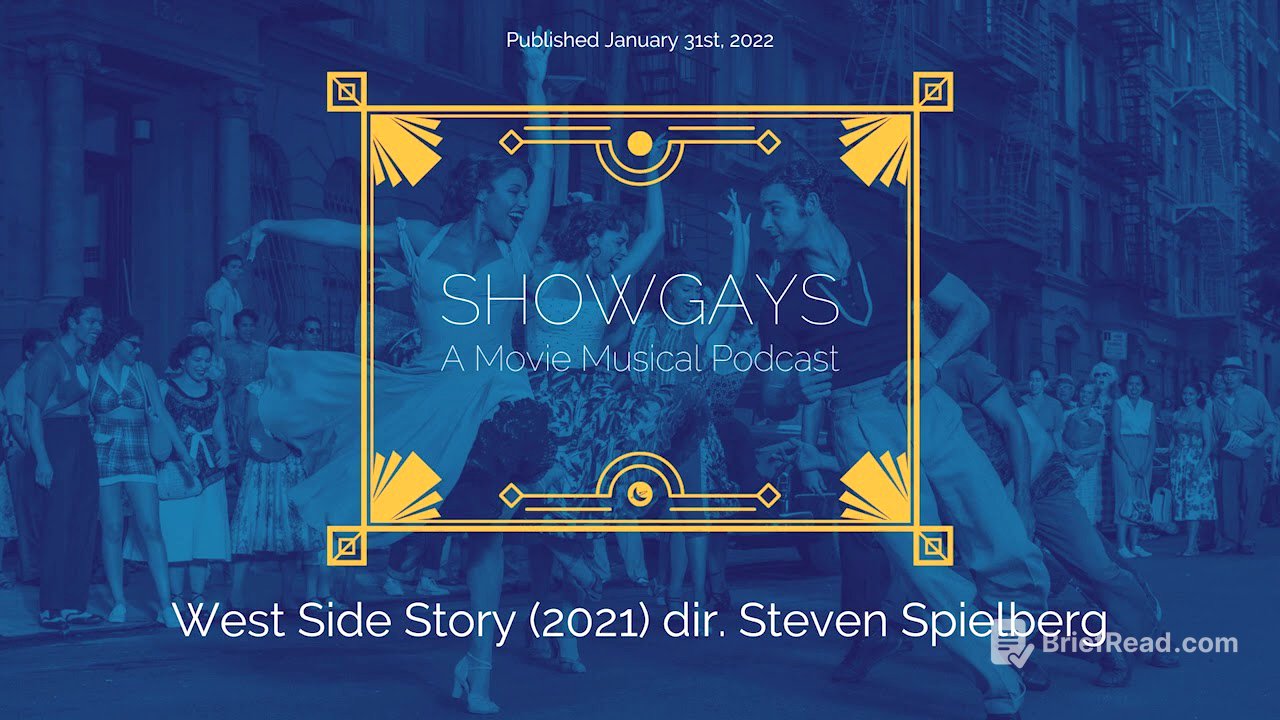TLDR;
This YouTube video is a discussion and review of Steven Spielberg's 2021 adaptation of "West Side Story" by The Ampliverse podcast. The hosts and guests share their personal histories with the musical, analyze the plot, and discuss the film's themes, characters, and production choices. They also compare it to the original 1961 film and the stage versions, focusing on the adaptation's successes and shortcomings.
- The hosts discuss the historical context of the film, including the demolition of San Juan Hill to build Lincoln Center.
- They analyze the characters, particularly Anita, Bernardo, and Maria, and praise the performances of Ariana DeBose and Rachel Zegler.
- The hosts discuss the film's themes of racism, gang violence, and cultural identity, and debate the effectiveness of the film's representation of Puerto Ricans.
Meeting Steven Spielberg [0:00]
The speaker recounts meeting Steven Spielberg backstage at Hamilton. Spielberg mentioned remembering their encounter and thinking about working with her in the future. The speaker also shares an anecdote about asking Spielberg for permission to participate in her senior year musical, Shrek The Musical, to which Spielberg, who produced the original Shrek, enthusiastically agreed.
Filming "America" [1:43]
The speaker describes the challenges of filming the "America" scene in West Side Story due to wardrobe and physical constraints. The slippery silk dress and sharkskin suit, combined with sloping shoulders and an uncooperative posterior, made the iconic shoulder-standing pose difficult to achieve.
Intro to West Side Story Discussion [3:39]
The hosts introduce the episode's focus on West Side Story, acknowledging personal biases and aiming for an informational recap. They joke about current events, including the Omicron variant, and mention Nicole Kidman's AMC ad, which has become a cultural phenomenon.
Plot Recap [7:03]
Molly provides a detailed plot summary of West Side Story, highlighting the rivalry between the Jets and the Sharks, the love story of Tony and Maria, and the tragic consequences of their relationship. The summary includes key events such as the rumble, Bernardo's death, and Tony's death, and notes the musical's unique ending without a traditional finale.
Preconceived Notions [10:14]
RJ shares his initial expectations for the 2021 adaptation, noting he anticipated a darker, grittier version. He mentions a poorly received recent stage adaptation and Lin-Manuel Miranda's involvement in redoing some lyrics in Spanish. RJ also notes positive critical reception influenced his expectations.
Personal History with West Side Story [11:55]
Adam and RJ share their first experiences watching West Side Story. Adam recalls watching the movie with Molly in college and being surprised by how much he enjoyed it. Molly remembers watching it in high school as part of a DVD pack of movie musicals.
College Production and Musical Score [21:20]
The hosts discuss a potential college production of West Side Story that was ultimately canceled due to rights issues. Molly expresses her dislike for the musical, while Adam defends it, praising the score as the best in musical theater history. He acknowledges the problematic aspects of the musical, particularly the portrayal of Puerto Ricans by white creators.
Origins of West Side Story [24:04]
The hosts discuss the origins of West Side Story, which was initially conceived as East Side Story, a conflict between Irish Catholics and Jews. They detail the creators: Jerome Robbins, Leonard Bernstein, and Arthur Laurents, and how Stephen Sondheim was brought in to write lyrics. The discussion touches on the shift to a Puerto Rican and white gang conflict, inspired by Mexican-American turf wars and the Zoot Suit Riots.
Historical Context and Teen Gangs [29:44]
The hosts discuss the rise of teen gangs in the 1950s and their connection to the themes of West Side Story. They mention an FBI report indicating a significant increase in juvenile court cases during that period. The discussion also touches on the blacklisting of Bernstein and Laurents and Jerome Robbins's cooperation with the House Un-American Activities Committee.
Changes from Romeo and Juliet and Production Details [31:29]
The hosts discuss the changes made to the Romeo and Juliet story in West Side Story, including the removal of characters and plot elements. They mention the invention of slang terms, the addition of Officer Krupke for comedy, and the relocation of "One Hand, One Heart." The discussion also covers production challenges, such as finding funding and casting the roles, and notes that Columbia Records initially rejected the cast recording.
Movie Details and Development [37:12]
The hosts provide details about the 2021 film adaptation, including the director (Steven Spielberg), screenwriters (Tony Kushner), and cast members (Ansel Elgort, Ariana DeBose, Rachel Zegler). They discuss the film's budget, box office performance, and critical reception, noting its numerous award nominations. The development of the film, starting in 2014, and Spielberg's desire to make an old-fashioned musical are also mentioned.
Initial Reactions and Setting [43:16]
The hosts share their initial reactions to the 2021 film, praising its specific setting in the Lincoln Center construction site. They discuss how this choice heightens the stakes and emphasizes the characters' struggle for territory and identity in a rapidly changing neighborhood. The hosts also appreciate the film's cohesive vision and the confidence of its creators.
World Building and Community [50:08]
The hosts discuss the film's effective world-building, particularly the visual details that convey the shifting demographics and community dynamics. They highlight the scene where the Jets deface a Puerto Rican mural and the community's response, emphasizing the Sharks' sense of ethical justification. The hosts also praise the "America" musical number for its portrayal of the Puerto Rican community and its witty lyrics.
Language in the Film [57:02]
The hosts discuss the use of Spanish in the film and Steven Spielberg's decision not to include subtitles. They reference Lin-Manuel Miranda's rewrites for the 2009 Broadway production, which included more Spanish-speaking scenes. The hosts debate the effectiveness of mixing Spanish and English in the film, considering the characters' backgrounds and motivations.
Characters' Use of English [1:04:51]
The hosts analyze how different characters use English in the film, highlighting Anita's desire to assimilate, Krupke's inability to understand Spanish, and the sergeant's assertion of power. They praise the nuanced portrayal of these characters and their motivations.
Anita's Character [1:06:45]
The hosts discuss Ariana DeBose's performance as Anita, praising her portrayal of the character's struggles and strength. They highlight the difficulty of the role, particularly the emotional turn in "A Boy Like That," and commend DeBose's ability to convey Anita's understanding and acceptance. The hosts also discuss the assault scene and its impact on Anita's perspective.
Bernardo and Maria's Relationship [1:16:16]
The hosts discuss the enhanced relationship between Bernardo and Maria in the 2021 version, noting the added scenes and background that provide more context. They appreciate the change that Maria doesn't have parents there, and how Bernardo feels responsible for Maria.
Valentina's Character [1:22:17]
The hosts discuss the new character Valentina, played by Rita Moreno, and her role as a bridge between the white and Puerto Rican communities. They praise the decision to give her the song "Somewhere," highlighting its impact and resonance. The hosts also discuss Valentina's role in the assault scene and the significance of Anita's lines to her.
The Jets and Racism [1:38:09]
The hosts discuss the portrayal of the Jets and their racism, noting the attempts to make their motivations somewhat sympathetic. They debate the effectiveness of this approach, considering the film's history of criticism for its portrayal of Puerto Ricans. The hosts also discuss the G officer krupke skit sequence and its commentary on the system's failure to support these boys.
Anybody's Character [1:53:38]
The hosts discuss the character of Anybody's, noting the actor Iris Menas is a trans masculine person. They discuss the character's gender identity and the challenges they face in the film. The hosts also highlight the scene where Anybody's warns Anita before she walks into the drugstore, emphasizing the character's understanding of gendered violence.
Tony and Maria [2:00:21]
The hosts discuss the characters of Tony and Maria, acknowledging the allegations against Ansel Elgort and their impact on the film. They praise Rachel Zegler's performance as Maria and discuss the changes made to Tony's backstory, including his time in prison. The hosts debate the effectiveness of the actors' performances and the believability of their love story.
Musical Numbers and Cinematography [2:18:50]
The hosts discuss the musical numbers in the film, highlighting the staging, choreography, and vocal performances. They praise the cinematography, particularly in the "Maria" sequence, and discuss the staging of the balcony scene. The hosts also discuss the "Tonight" quintet and its impact.
Homage and Representation [2:24:35]
The hosts discuss the film's homage to the original movie and its overall artistic quality. They acknowledge the criticisms regarding the representation of Puerto Ricans and the lack of non-white individuals on the production team. The hosts also recommend reading "The Great West Side Story Debate" in the New York Times for a nuanced discussion of these issues.
Critical Reception and Movie Musicals [2:28:36]
The hosts share the critical reception of the film, noting its high rating on Rotten Tomatoes and positive reviews from various publications. They also discuss the recent struggles of movie musicals at the box office and debate which classic Golden Age musical they would revive to revitalize the genre. The hosts end the episode by thanking their listeners and teasing the next episode's topic.









